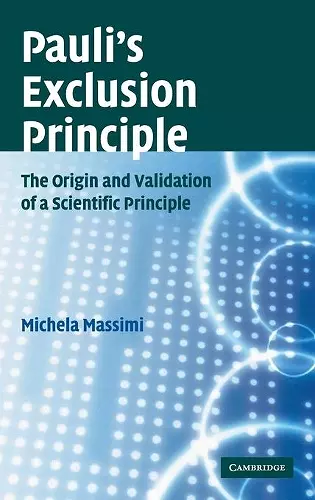Pauli's Exclusion Principle
The Origin and Validation of a Scientific Principle
Format:Hardback
Publisher:Cambridge University Press
Published:4th Aug '05
Currently unavailable, and unfortunately no date known when it will be back
This hardback is available in another edition too:
- Paperback£44.99(9781107410732)

This book develops a philosophical framework for understanding a scientific principle's validation, for philosophers, historians and physicists.
There is hardly another principle in physics with more far-reaching consequences than Pauli's exclusion principle. This book explores the principle's origin, its embedding into quantum mechanics, and later experimental validation and analyses the principle's emergence and validation from historical and philosophical viewpoints. The book will interest philosophers, historians and physicists.There is hardly another principle in physics with wider scope of applicability and more far-reaching consequences than Pauli's exclusion principle. This book explores the principle's origin in the atomic spectroscopy of the early 1920s, its subsequent embedding into quantum mechanics, and later experimental validation with the development of quantum chromodynamics. The reconstruction of this crucial historic episode provides an excellent foil to reconsider Kuhn's view on incommensurability. The author defends the prospective rationality of the revolutionary transition from the old to the new quantum theory around 1925 by focusing on the way Pauli's principle emerged as a phenomenological rule 'deduced' from some anomalous phenomena and theoretical assumptions of the old quantum theory. The subsequent process of validation is historically reconstructed and analysed within the framework of 'dynamic Kantianism'. The variety of themes skilfully interwoven in this book will appeal to philosophers, historians, scientists and anyone interested in philosophy.
Review of the hardback: 'Michela Massimi seeks in her marvellous book a more systematic answer to a more specific question: 'under what conditions are we justified in regarding an empirical and contingent rule as a scientific principle?' … The result is a subtle, thought-provoking book that exemplifies the good that can come of putting careful history of science to sound philosophical use …Massimi's book is a significant contribution to the history and philosophy of physics and offers fresh perspectives on long-standing philosophical problems regarding science.' Kent Staley, British Journal for the History of Science
Review of the hardback: '… accurate, and very well informed … Her mastery of philosophical sources is equally impressive … Pauli's Exclusion Principle offers an effective presentation of an interpretative perspective in which scientific principles, rather than isolated theories, play a unifying role.' Edward MacKinnon, Isis
Review of the hardback: '… excellent book which demonstrates great physical and historical understanding of the topic … The book yields an important contribution to our understanding of not only Pauli's exclusion principle but of the development of quantum physics during the 20th century. It combines physical insight, historical scrutiny, and philosophical skills, which is not a common combination.' Jan Faye, Metascience
Review of the hardback: 'Massimi's richly articulated case study is a timely intervention in a rapidly growing literature on distinctive transcendental idealist approaches in philosophy of physics and on the contested topic of structural realism. In masterfully marrying philosophical analysis to physical and historical knowledge, it sets a high standard for what work in this area may accomplish. But it also should be read by those who remain to be convinced that Kantian-oriented philosophy of physics is once again alive and well.' Thomas Ryckman, Kantian Review
Review of the hardback: 'It is precisely the integration between historical description and philosophical analysis which makes the book so appealing and relevant to current science studies. … a book such as Massimi's clearly demonstrates that in some cases an integrated historico-philosophical approach is not only possible but also eminently fruitful.' Helge Kragh, British Journal for the Philosophy of Science
ISBN: 9780521839112
Dimensions: 236mm x 161mm x 20mm
Weight: 500g
226 pages